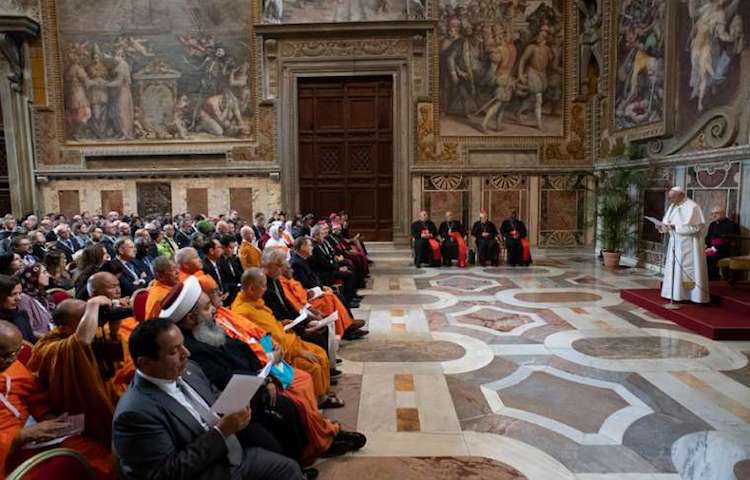By Ramesh Jaura
VATICAN CITY (IDN) – Nearly six months before the heads of state and government convene to review the implementation of the 2030 Agenda for Sustainable Development at the UN General Assembly’s ‘SDG Summit’ in September, the world religions have tasked themselves with elaborating “a road map or lines of action that can connect religious contributions to the implementation of the SDGs”.
“The idea is to work together on this joint ‘journey’ in order to raise ambition and forge a new global solidarity,” Cardinal Peter K. Turkson, a Ghanaian cardinal of the Roman Catholic Church, who heads the Dicastery for Promoting Integral Human Development, said in an interview with IDN.
The Dicastery and the Pontifical Council for Interreligious Dialogue organised a three-day International Conference on Religions and Sustainable Development Goals (SDGs): Listening to the cry of the earth and the poor’.
Participants in the conference that concluded on March 9 were the representatives of different religions, diplomats, and leaders of international organisations, engaged with implementing sustainable development goals, as well as scholars and researches in the general area of international development.
Speaking to participants on Match 8, the Pope said: “Three and a half years since the adoption of the sustainable development goals, we must be even more acutely aware of the importance of accelerating and adapting our actions in responding adequately to both the cry of the earth and the cry of the poor – they are connected.”
The challenges are complex and have multiple causes; the response, therefore, must necessarily be complex and well-structured, respectful of the diverse cultural riches of peoples, the Pontiff added.
“If we are truly concerned about developing an ecology capable of repairing the damage we have done, no branch of science or form of wisdom should be overlooked, and this includes religions and the languages particular to them… Religions can help us along the path of authentic integral development, which is the new name of peace …”.
The reason, Pope Francis explained, is that the 2030 Agenda and the Sustainable Development Goals, approved by more than 190 nations in September 2015, were a great step forward for global dialogue, marking a vitally ‘new and universal solidarity’…
“Different religious traditions, including the Catholic tradition, have embraced the objectives of sustainable development because they are the result of global participatory processes that, on the one hand, reflect the values of people and, on the other, are sustained by an integral vision of development,” he added.
In opening remarks to the conference on March 7, Cardinal Turkson said that there are three groups of people who can provide the extra energy required for sustainable future.
“The young people, who are demanding change and calling for intergenerational justice. The indigenous people, who inhabit 80 percent of the land with biodiversity reserves in the world and remind us of the importance of the interconnection between our wellbeing and our territory. And religious people, who can provide inspiration for converting us from our own attitudes of domination and destruction, and for promoting attitudes of love and care,” Cardinal Turkson noted.
The three groups, all of them represented at the Vatican conference, can also encourage humanity to change the structures that foment inequality and environmental damage, into structures that promote inclusion and ecological caring, he added. “While listening to these three groups, we can find the way of responding effectively to the cry of the earth and the cry of the poor.”
Asked what religions have to do with development, Cardinal Turkson told IDN: “Sustainable development, as the UN World Commission on Environment and Development (UNWCED) defines it, is ‘development that meets the needs of the present without compromising the ability of future generations to meet their own needs’. What social institution best pursues this than religion?”
Besides, with about 80 per cent of the world’s population professing a belief in God, religion is “an inescapable reality in international development”. Religions, Cardinal Turkson added, are key players in the development of humankind. Religions have invested greatly in education and the healthcare needs of peoples all over the world. They have been often the first respondents to disasters and organize relief services (cf. Cartias networks, Relief agencies of Religions, Tzu Chi Buddhists of Taiwan, etc).
According to a UNICEF report, religions provide 64 percent of education in Sub-Saharan Africa, and run around a third of all medical facilities of the planet.
Finally, religions bring and inspire purpose for change. “If we want to forge sustainable development, we may need to change urgently and radically patterns of lifestyles, ways of producing goods, trading, consuming and wasting. Such a change requires deep motivation, a motivation that the technical language of development often cannot provide.
“Among powerful stories that trigger life-change, religious narratives stand out. These narratives, transmitted from one generation to another, have captured the imagination of millions of people and countless communities worldwide. They can actually provide the incentive for the transformation we need today.”
In 2018, the Inter-governmental Panel of Climate Change (IPCC) warned that humanity has less than a decade to embark on a systemic transformation of our consumption and production systems so as to keep global warming within the range of 1.5 degrees, Cardinal Turkson said. “So please, let us not lose this sense of urgency for change while we debate on the way we are shaping the future of our planet,” he implored. [INPS Japan/IDN – 09 March 2019]
Photo (top): Pope Francis addresses participants in a conference on religions and the sustainable development goals, in the Vatican’s Clementine Hall March 8, 2019. Credit: Vatican Media.


